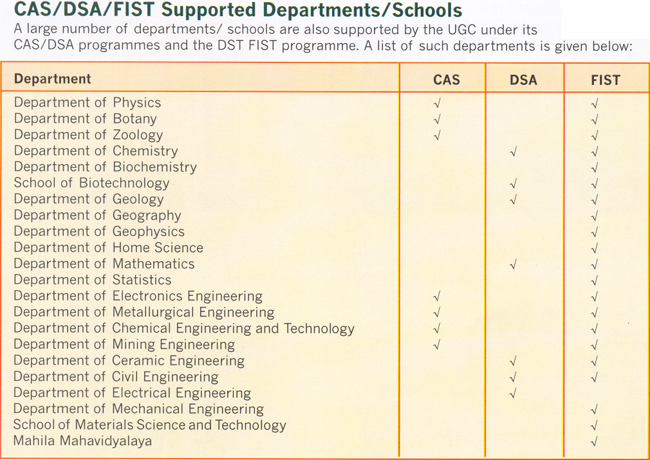Programs & Projects
MOU's have been signed with SAARCand other Asian countries as well as those in the European Union and the Americas. As an example faculty from the IMS are deputed to B.P Koirala Institute for Health Sciences University, Nepal to assist in their teaching programmes. International bilateral programmes for research also exist.
Research Priorities and Reforms The quality of teaching will largely depend upon the extent to which the University is able to strengthen its research programmes, both in quality and quantity (i.e., number of Ph.D. degrees awarded, publications in quality journals etc.)
(a) Strengthening of the Research Programmes
At any instant of time, the University should have
about 3000 high quality Ph.D. scholars and a large
number (1000) of postdoctoral researchers. All
these research scholars have to be provided hostel
accommodation and reasonable sitting space in the
respective departments/schools. The University
should aim for creating 1000 Ph.D. Research
Fellowships in various disciplines. There is an urgent
need for massive and sustained funding for
modernization and removal of obsolescence in the
research laboratories of the three Institutes and the
Faculty of Science. Merely bringing in equipment
will not help research activities unless it is matched
by recurring research grant to each Department!
School in the range of Rs. 50 to 100 lakhs per
annum for meeting the cost of consumables,
equipment maintenance and spares. For the
Departments/Centres in other faculties also,
provision for recurring research grants of Rs.10 to
25 lakhs per unit will have to be made. The budget
for research journals and books has also to be
enhanced by an order of magnitude.
(b) Research Priority Areas
The University has identified research priority areas
through presentations and discussions in several
sessions chaired by the present Vice-Chancellor. It is
expected that the respective faculties will direct their
resources in these priority areas on a differentiated
basis. There are special flagship areas with credible
eminence such as : Theoretical Condensed Matter
Physics, Materials Science and Technology, Genetics
and Biotechnology, Environmental Ecology, Women
Studies, Ayurveda, Vocal Music, Infectious
Diseases, Sanskrit and Dharm Vigyan and Conflict
Resolution. These areas are to be nurtured to help
them maintain international competitiveness.
Bharat Kala Bhavan is considered as the best
University Museum in India, if not in Asia. There is
no University in India which has a museum of this
dimension and quality. There are approximately six
hundred museums in India today and even among
these museums of a diverse nature, Bharat Kala
Bhavan has carved its permanent niche and is
being considered among the seven-eight best
museums in the country. The museum is fully
dedicated to the cause of higher education and
multidisciplinary researches. The academic
possibilities of this museum being immense, the
University proposes to develop a Ph.D. degree
programme in Museology to be managed by the
Bharat Kala Bhavan in collaboration with the
Faculty of Fine Arts. Further, the University also
plans to promote publication of books on the
Bharat Kala Bhavan collections. Preservation and
digitization of rare paintings and manuscripts are
to be given priority. The University proposes to
allocate sufficient funds to this centre for these
activities.
(c) R & D Projects
The Vice-Chancellor has taken personal interest in
encouraging the faculty members to generate
additional resources for research activities through
sponsored research projects. As a result of this
initiative, there is a substantial change in the mind.
set and it is expected that more faculty members
would have funding through sponsored research
projects. The University proposes to introduce all
necessary reforms in existing rules for smooth
management of the projects.
(d) Industrial Collaborations
The improvements in the infrastructure of the
University in general and the research laboratories
in particular are expected to attract more industrial
collaborations opening ways for additional funds.
The University will provide all possible support for
such collaborations.
(e) Patenting and IPR
The University has already formed an IPR Cell to
encourage the patenting culture. It is proposed that
in due course of time, the University will make
provisions for meeting all the expenses related to
filing Indian and international patents.

 BHU Banaras Hindu University
BHU Banaras Hindu University